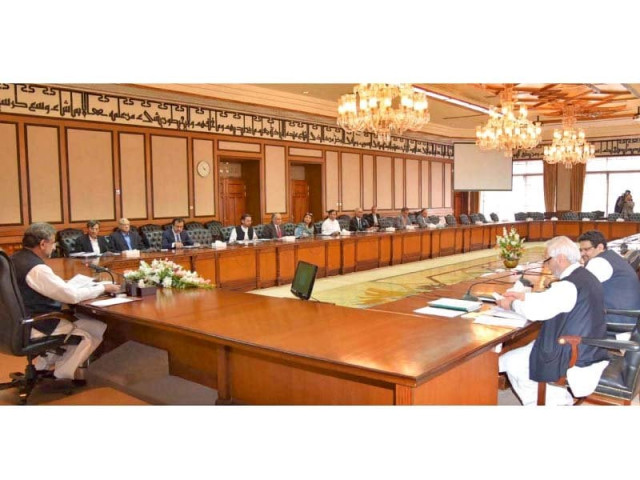Govt approves five-year tax break for tribal areas
Removes Neelum-Jhelum surcharge from commissioning date of the project

Non-customs duty-paid vehicles would be allowed to be used in Fata and Pata for five years ending June 30, 2023. However, these vehicles will not be allowed to cross over to other areas of the country. PHOTO: ONLINE
Headed by Prime Minister Shahid Khaqan Abbasi, the Economic Coordination Committee (ECC) of the cabinet approved the tax exemptions hours before the end of his government’s term.
The ECC also approved the end of 15-paisa-per-unit Neelum-Jhelum surcharge with effect from commissioning date of the project.
Govt approves five-year tax break for tribal areas
It approved comprehensive tax exemptions and other incentives for the next five years for the people of erstwhile federal and provincial tribal areas after the landmark 31st Constitutional Amendment, according to an announcement by the PM Office.
President Mamnoon Hussain on Thursday also signed the 25th Constitutional Amendment, giving effect to the merger of Federally Administered Tribal Areas (Fata) and Provincially Administered Tribal Areas (Pata) with Khyber-Pakhtunkhwa.
Khyber-Pakhtunkhwa Assembly Speaker Asad Qaiser had written a letter to National Assembly Speaker Ayaz Sadiq, informing him about the objections raised by lawmakers belonging to Pata over the omission of tax exemptions enjoyed by the people of Pata before the Constitutional Amendment Act 2018.
He said the bill would roll back the tax break previously granted to the people of Malakand Division.
Tax exemptions
The federal government has approved exemption from income tax on profits and gains of existing businesses conducted by individuals of Fata and Pata for five years. These businesses, however, need to be registered with the Federal Board of Revenue (FBR) by September 30, 2018, according to the official handout.
The government has also approved exemption from sales tax for the retailers to facilitate general consumers. Domestic consumers of electricity would be exempted from sales tax.
Non-customs duty-paid vehicles would be allowed to be used in Fata and Pata for five years ending June 30, 2023. However, these vehicles will not be allowed to cross over to other areas of the country.
On the expiry of five years, vehicles will be regularised on payment of duty and taxes, according to the announcement.
There will also be exemption from all types of withholding taxes, except for the withholding tax on salary.
Any person seeking to set up a new industrial undertaking has been granted exemption from income tax, subject to prior approval of the ECC.
However, the Federal Excise Act 2005 will replace the Central Excise Act 1944 and imports meant for the defunct Fata and Pata regions will be subject to taxes, as was the case before the merger.
Neelum-Jhelum surcharge
The ECC decided that the Neelum-Jhelum surcharge would end on reaching the commercial operation date of the 969-megawatt project. The water resources secretary assured the ECC that the project would be fully commissioned by June. However, in case of further delay, the surcharge will be automatically extended further.
The surcharge was imposed in 2007 for eight years with the expiry date of Dec 31, 2015 to finance the project. It was later extended till June 2018.
It was expected the project would be completed in time, but it was delayed. Cost estimates almost quadrupled to Rs507 billion, with the fresh completion target of June 30, 2018.
The government has so far collected more than Rs65 billion through the surcharge. Initially, the surcharge was 10 paisa per unit, which was increased three years ago by 50% to 15 paisa per unit.
SC seeks explanation on taxes imposed on petroleum products
Cheap housing finance
The ECC approved re-lending terms for Pakistan Mortgage Refinance Company Limited (PMRCL) for ensuring efficacy of the facility to promote low-cost/affordable housing in Pakistan.
The company would give small housing loans at 3% concessionary rate and the government will bear the difference between the client’s borrowing cost and the bank’s lending rate.
The government holds a 49% stake in the company while private sector banks have the remaining majority share. Among shareholders are the Ministry of Finance, Habib Bank Limited, United Bank Limited, National Bank of Pakistan, Askari Commercial Bank, Allied Bank Limited, Bank Alfalah, Bank AL Habib and House Building Finance Company. Pakistan has one of the lowest mortgage-to-GDP ratios in the region, standing at a paltry 0.5%.
Published in The Express Tribune, June 1st, 2018.
Like Business on Facebook, follow @TribuneBiz on Twitter to stay informed and join in the conversation.



















COMMENTS
Comments are moderated and generally will be posted if they are on-topic and not abusive.
For more information, please see our Comments FAQ